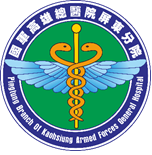Angina pectoris care precautions
Date:2024-04-02Pingtung Branch of Kaohsiung Armed Forces General Hospital
Angina pectoris care precautions
1.What is angina pectoris?
Angina pectoris is a subjective feeling of chest discomfort and unexplained chest pain. It may be described as a dull pain as if being pressed by a heavy object, a feeling of tightness in the pit of the stomach, or a feeling of weakness. The symptoms are caused by narrowing or spasm of the coronary arteries of the heart. It is caused by poor local blood supply, resulting in myocardial hypoxia.
2.Symptoms of angina pectoris?
You may feel pain, burning, tightening, numbness, weakness or restraint in the front of your chest or left shoulder, neck, chin and left upper arm, which may be accompanied by symptoms such as shortness of breath, cold sweat, nausea and vomiting, dizziness and other symptoms.
3.How long do angina pectoris symptoms last?
Angina attacks are short-lived, usually 1 to 5 minutes, but may last 15 to 20 minutes when you are full or extremely angry.
4.Precautions for angina pectoris attack?
(1) Stop all activities and find a place nearby to rest.
(2) Use nitroglycerin tablets correctly. After taking the medicine, symptoms such as temporary dizziness may occur. It is recommended that you do not stand before use. You should sit or lie down to avoid falling. Take 1 nitroglycerin tablet with it. Put it under the tongue, do not swallow it directly. Please try not to swallow saliva before the tablet is dissolved. If the symptoms do not improve after taking the medicine, take one tablet under the tongue every 5 minutes. It can be used up to three times. If the symptoms are not improved within 15 minutes after the attack, , after three consecutive uses (3 pills), if you still feel unwell, you should go to a medical institution immediately.
(3) After taking the medicine, please do not eat, drink or smoke within 5-10 minutes to avoid causing hypotension symptoms.
(4) After taking the medicine, dizziness may occur. If you have to perform dangerous work, such as driving or operating machinery, you should be careful.
5.How to prevent angina pectoris?
(1) Stay in a good mood and avoid being stressed out, frightened, or having severe emotional ups and downs.
(2)If you are overweight, please lose weight.
(3) Please stop smoking, because smoking will reduce the oxygen content of your heart and easily cause angina pectoris.
(4) Avoid eating high-calorie and high-cholesterol foods, such as egg yolks, offal, fish eggs, crab roe, shrimp eggs, squid, clams, etc.
(5)Eat high-fiber foods, such as vegetables and fruits, to avoid constipation.
(6) Exercise regularly every day, such as walking and riding a bicycle, to promote blood circulation. If you have no exercise habit, you should avoid sudden fast running, excessive exercise, or heavy lifting.
(7) If you have symptoms of “three-hypers”, please pay attention to controlling blood pressure, cholesterol and blood sugar, take medicines on time, and cooperate with diet control.
6.Preservation methods and precautions for nitroglycerin tablets?
(1)Keep nitroglycerin tablets with you or within easy reach.Relatives who live with the patient should be familiar with the use and placement of medications.
(2)The medicine can be stored for six months. Please pay attention to whether the color of the medicine changes.
(3)How to tell whether the medicine is working. For example, when the medicine is held under the tongue, there will be numbness, burning or tingling.
(4)Medications should be placed in dark jars, protected from light, tightly capped, and stored in a dry, room temperature place.
(5) After taking aphrodisiacs such as Viagra, do not take nitroglycerin tablets within 24 hours, or use them together at the same time, because the effects of the drugs may interact and cause fatal hypotension.
7.Risk factors leading to angina pectoris
Smoking, diabetes, high blood pressure, hyperlipidemia, family history of heart disease, obesity, postmenopausal women, lack of exercise, drug abuse.
8.References
Health Promotion Administration Ministry of Health and Welfare